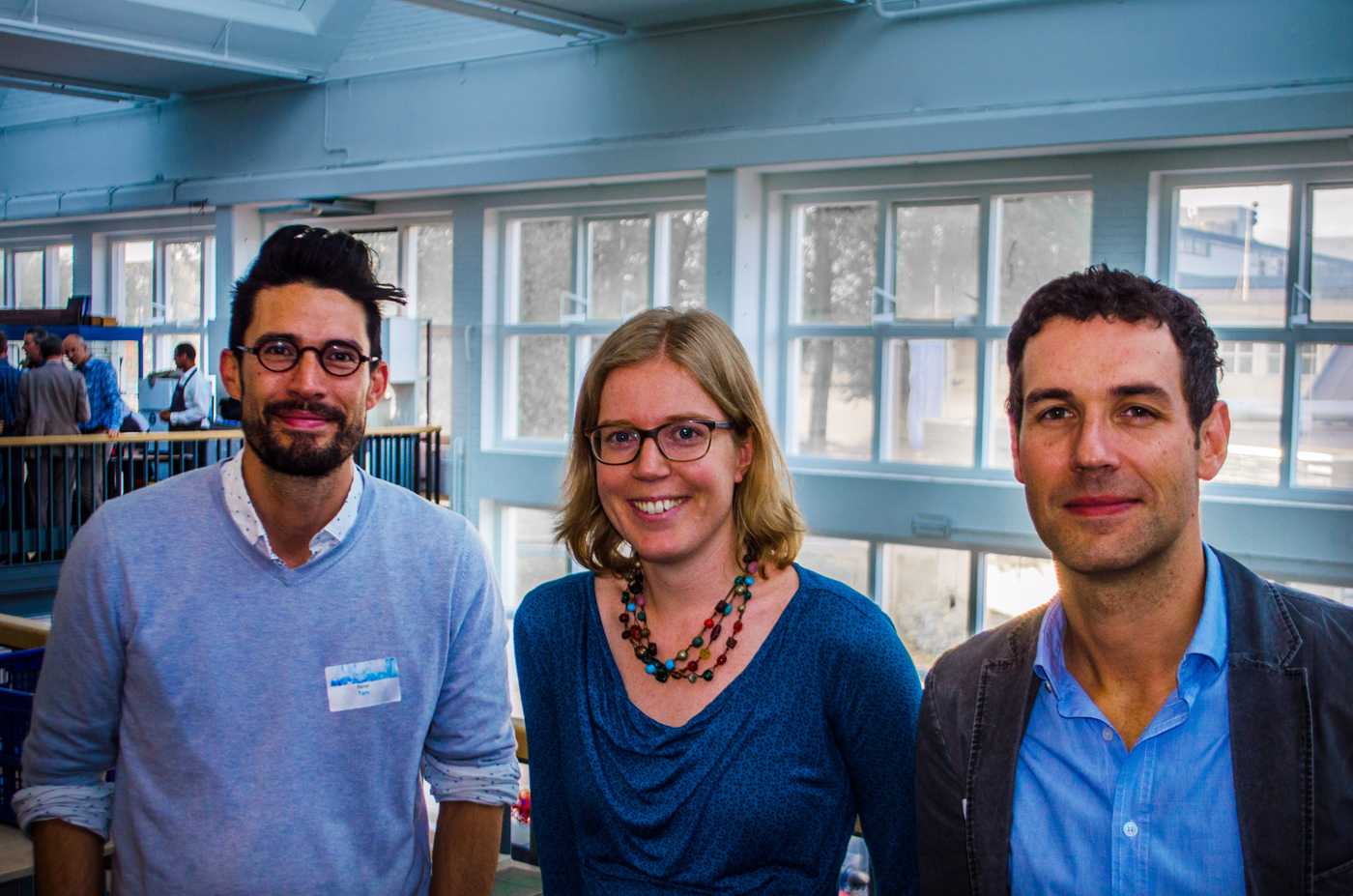How to seize the future of fluid mechanics by reading its past? At the centennial celebration of the Delft Burgers Lab, last week, three young researchers shared their views.
From left to right Daniel Tam (TU Delft), Hanneke Gelderblom (TUe) and Alvaro Marin (UTwente) (Photo: Giulio Dacome)
It almost sounds unbelievable that some of the most common phenomena people experience on a day-to-day basis are in fact mysterious, elusive dark areas of science. For instance, many are familiar with turbulence. On every flight, everyone experiences this. Yet, after centuries of scientific research and theories produced about the topic, turbulence still manages to swiftly dodge all explanations that scientists try to give to it. Maybe it is the degree of randomness that the phenomenon inherently possesses. Maybe because mathematical tools are incapable of quantifying the flow properties. Maybe, science just doesn’t get it. And with it, many other areas in the field of fluid mechanics are still obscure, and wait for science to shine light on them.
This and more was discussed at the Burgers Centrum’s centennial celebration at the Faculty of Mechanical Engineering last week. Multiple speakers and shared their opinions with the audience. Particularly capturing was the presentation given by three young researchers about ‘The Future of Fluid Mechanics’. Dr. Hanneke Gelderblom from TU Eindhoven, Dr. Alvaro Marin from the University of Twente and Dr. Daniel Tam from TU Delft gathered the opinion of many experts in the field and shared their thoughts about how this field will evolve in the next 100 years.
‘We still don’t know how to use computers’
But let’s go back for a second. Almost 200 years ago, around 1822, the Navier-Stokes equations were formulated by Claude-Louis Navier and George Gabriel Stokes. The three speakers all convened that these equations are the central piece of the complex puzzle that describes the behaviour of most fluids. As of today, no closed form solution of these equations exists. Yet, they form the basis of every flow problem. Gelderblom reminded how going back to theory will always have to be the first step in analysing any problem. A statement that might seem obvious, but what about feeding a supercomputer a bunch of data and just let it figure it out? Who needs theory if this were the case? A scenario that Gelderblom referred to as plausible, but unlikely.
The giant leaps in computational power that have been taken in recent times make, in fact, computer-based predictions and numerical simulations more and more attractive due to their being cheap, generally accurate and sometimes able to resolve phenomena that would not be possible to reproduce experimentally. Marin mentioned how certain kinds of experiments might decline in the future in favour of computational solutions. However, he also mentioned how ‘we still don’t know how to use computers’: they produce so much data and, as Tam mentioned, science can only make sense of so many variables. “For the sake of fluid mechanics, velocity in three dimensions and pressure are more than enough. Add temperature and wohoo!”, he said.
‘It is an extremely exciting time to be involved in fluid mechanics’
So, what are the new frontiers of this field except from turbulence? Tam is conducting research on nano-flows (the ‘fluids that are alive’). These are a very common type of flow that occurs in all living beings. Flows on the cell-scale, for instance, fall into this category. Tam explains that at that scale, the assumption of the fluid as a continuum no longer holds. The Navier-Stokes equations break. And so does science’s understanding.
Also, what if you add particles, or polymers, to the flow (a complex fluid)? Well, Navier-Stokes breaks, again. Marin reminded how industry has managed to create extremely complex fluids with all sorts of ingredients (e.g. fast-drying inks). True: it works. But nobody really knows exactly why.
The three all agreed that this time is an extremely exciting one to be involved in fluid mechanics, due to the many opportunities and challenges this field possesses. None of them being willing to make a prediction on what the future will exactly reserve for us, the three let the great Arthur C. Clarke talk from 1964 when, as asked how the future would be, he said that ‘the only thing that we can be sure of the future is that it will be absolutely fantastic’.
An animation showing research carried out at the Burgers Centrum: the interaction of a high-power laser with droplets of water. Hanneke Gelderblom collaborated to this project.
Read more about the past of fluid mechanics here (Dutch only).
Giulio Dacome / Stagiair



Comments are closed.